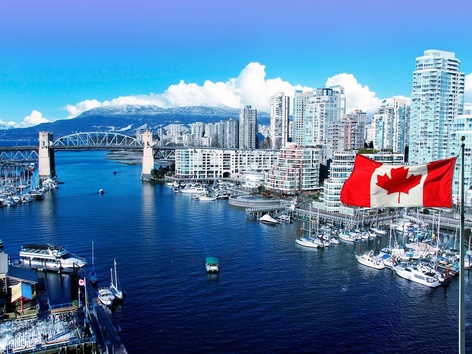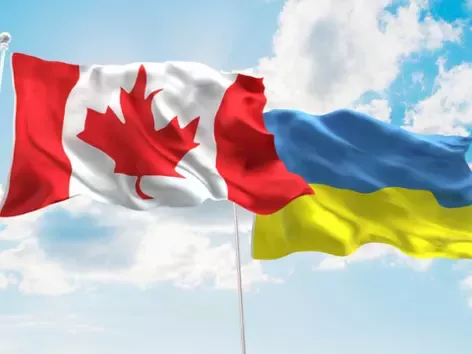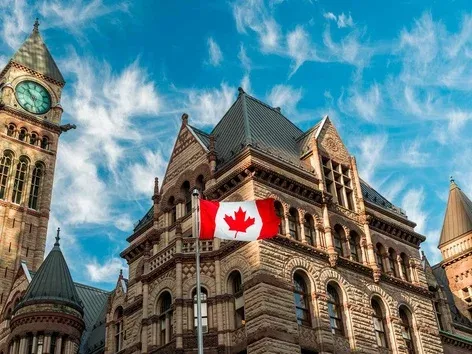Canada: rules of entry and residence in 2024. What Ukrainians need to know? (updated)
Inhaltsübersicht
- CUAET Programme: Canada for Ukrainians 2024
- How to get to Canada as a Ukrainian in 2024: entry rules
- Programme for Ukrainians in Canada 2024: family reunification
- Is Canada accepting refugees from Ukraine in 2024 under the Alberta Opportunity Stream programme?
- Medical services in Canada
- Finding accommodation in Canada
- Working in Canada for Ukrainians

Ukrainians wishing to go to Canada in 2024 should familiarise themselves with the new immigration rules, as the government of this country has made adjustments in this matter. Find out how to get to Canada, what documents are needed and whether there are now programmes for Ukrainian citizens
Canada, like many other countries around the world, helps Ukrainians fleeing the war. However, over time, the rules for Ukrainians intending to move there have changed. So, we will tell you what you need to pay attention to if you are considering Canada as a country to move to temporarily or permanently.
Read more about immigration to Canada for Ukrainians in 2024, visa obtainment, relocation opportunities, rules for obtaining a residence permit and work permit here.
More information about the country is available here:
- CUAET programme for Ukrainians in Canada.
CUAET Programme: Canada for Ukrainians 2024
As you know, since the beginning of the full-scale war in Ukraine, the Canadian government has created a special CUAET programme for Ukrainians, which allowed them to obtain a local visa. More than 1 million people applied for this programme, but only about 170,000 citizens took advantage of it.
In the summer of 2023, Canada closed the CUAET programme and it is no longer available.
Although the programme officially ended on 31 March, including the possibility of entering the country with a full package of support and applying for temporary residence, the programme continues to operate in a modified format.
Until 31 March 2025, Ukrainians arriving in Canada for the first time will still receive support, including free assistance with documents, advice on how to find a job, free language courses and legal advice. However, there will no longer be an airport pick-up and free hotel accommodation for the first two weeks.
Read more about the CUAET programme for Ukrainians in Canada here .
How to get to Canada as a Ukrainian in 2024: entry rules
Before travelling to Canada, a Ukrainian must obtain an entry permit. According to the rules, such a permit is a visa: a tourist, guest or business visa.
A visitor visa is intended for those who have received an invitation from relatives or friends to visit. In the absence of such an invitation, a tourist visa is preferred.
For business cooperation with Canadian partners, a business visa is recommended.
This type of visa is ideal for travelling for the purpose of negotiations, signing contracts and other business activities. The process of obtaining a Canadian visa, regardless of its type, involves the preparation of a standard package of documents.
For more informationabout a visa to Canada, what types of visas are available to Ukrainians and what steps you need to take to get into the country, please follow the link.
Read here to find out why Canada denies visas to visitors.
Visa to Canada for Ukrainians 2024: documents required
The list of documents is quite long, so we advise you to prepare them in advance, including copies. The list is as follows:
- scan of your international passport;
- scan of previous/second passport, if any;
- personal data
- digital photo;
- scan of the certificate from the place of work;
- a scan of a bank statement and cash flow for the last 6 months;
- scans of marriage/divorce/childbirth certificates;
- scan of property documents (apartment, car, land);
- booking of air tickets;
- hotel reservation;
- documents confirming the purpose of the trip.
If you have children, additionally:
- children's passports, make copies of the pages with stamps;
- copies of the children's birth certificates;
- parental permission to travel;
- a photo - 3.5 by 4.5 cm, in electronic format on a white background.
For a successful move and avoidance of troubles, it is worth contacting specialists. The lawyers of Visit Ukraine provide full support and advice on visa and migration issues to successfully resolve any nuances.
Recently, it became known that Canada is reducing the number of permanent residents. The Canadian Immigration Levels Plan for 2025-2027 is available here.
Programme for Ukrainians in Canada 2024: family reunification
On 22 October 2024, a special Canadian government programme that simplified the process of obtaining permanent residence for Ukrainians with relatives in this country ended. The programme was introduced as a response to Russian aggression against Ukraine and was aimed at supporting families separated by war. The new terms and conditions are available here.
It is important to note that all applications submitted before 22 October will continue to be considered in the normal course. Applicants retain the ability to use temporary permits while their cases are being considered, including the right to work and study in Canada.
After the special programme closes, Ukrainians can use standard immigration opportunities. These include the Express Entry programme for skilled workers, traditional family sponsorship, provincial immigration programmes and refugee programmes. While these pathways require more time to process, they remain available to all who meet the criteria.
The Canadian government continues to provide support to Ukrainians already in the country. This includes the possibility of obtaining and extending work, study and temporary residence permits.
Read more about the possibilities for Ukrainians to relocate to Canada after the programme closes here.
Don't want to miss important updates and useful articles? Subscribe to our weekly newsletter!
Is Canada accepting refugees from Ukraine in 2024 under the Alberta Opportunity Stream programme?
On 11 June 2024, the Alberta Opportunity Stream immigration programme introduced an updated application system.
Applications will be accepted on a monthly basis until the end of 2024 in four main areas: Alberta Opportunity Stream, Rural Renewal Stream, Accelerated Tech Pathway and Tourism and Hospitality Stream. Each month, a fixed limit is set on the number of applications, after which the acceptance is suspended until the next period.
Alberta Immigration has set seven application dates in 2024, starting on 11 June and ending on 10 December. Documents will be submitted on a specific date each month. All relevant information on quotas, processing and evaluation deadlines is published on the AAIP official website. Potential applicants are advised to check the portal regularly for updates as conditions may change.
Formore information about the Alberta Opportunity Stream programme and the available application dates in 2024, please follow the link.
Medical services in Canada
Healthcare in Canada is free if you have a Health Insurance Card. Refugees need to apply for it as soon as possible after arrival, as private healthcare in the country is paid for. The card is issued in the province where you have settled. The Health Insurance Card includes:
- consultations with family doctors and specialised doctors;
- diagnostics
- inpatient treatment;
- ambulance service
- vaccinations;
- most surgeries (appendicitis, removal of cancerous tumours, etc;)
- Pregnancy and childbirth.
In Canada, without insurance, it may be impossible to see a doctor. Although medical care will be provided in an emergency even without insurance, you should expect to be charged a hefty bill for the services rendered.
However, you can protect yourself from unforeseen situations in advance by taking out health insurance worldwide.
Take care of your health with health insurance from Visit Ukraine, which guarantees reliable protection. Ensure your peace of mind while travelling.
Finding accommodation in Canada
The first and one of the most important decisions you need to make when moving to Canada is to choose a region to live in. Canada is a large country with many interesting cities and towns. When choosing a province to move to, we recommend that you take into account the standard of living, the cost of renting a house, the average salary and weather conditions. Small towns should not be overlooked, as the cost of living in a small town is much lower than in a metropolis.
In Canada, almost a third of families rent. Most ads are posted online. When choosing a home for permanent residence, pay attention to the availability of nearby shops, schools, and the level of public transport.
Read more about insurance for entering Canada and the rules for applying for different visa categories here.
Working in Canada for Ukrainians
When you move to Canada, you will need to find a job to support yourself and your family. An open work permit allows you to work for almost any employer in Canada.
To find a job, we recommend using the government's free online job board, Job Bank. This is where employers who want to offer jobs to Ukrainians are registered. You can also create your own resume here and maybe a job will find you.
Ukrainians in Canada can extend their work or study permits without leaving the country. Read more about the new opportunities for Ukrainians under the new rules of the Canadian government here.
Just a reminder. Since the beginning of the full-scale invasion, Ukrainian refugees have been coming to Canada. To find out what jobs are available in Canada and what salaries Ukrainians can expect, please follow the link.
Want to know more? Read the latest news and useful materials about Ukraine and the world in the News section.
Our recommendation for a safe and comfortable trip:
Visit Ukraine Insurance - insurance for a safe stay abroad without unnecessary expenses;
Green Card - compulsory car insurance for traveling abroad;
Visit Ukraine Tickets - book tickets for buses, trains, and airplanes to/from Ukraine and between cities around the world;
Private Lawyer service - professional legal support on visa and migration issues;
Visit Ukraine Merch - buy patriotic clothing and accessories with worldwide delivery.
© 2018-2023, Visit Ukraine. Use, copying or reprinting of materials on this site is permitted only with a link (hyperlink for online publications) to Visit Ukraine.
All rights reserved.
Häufig
gestellte Fragen
What kind of assistance do Ukrainians receive in Canada?
How to open a visa to Canada for Ukrainians 2024?
What is the best city in Canada to live in?
Where is the cheapest place to live in Canada?
Recommended articles
3 min
Arbeit
Jobs in Canada for Ukrainians: available vacancies and salaries
Since the beginning of the full-scale invasion, more than 250 thousand Ukrainian refugees have fled to Canada. Find out more about what jobs are available in Canada and what salaries Ukrainians can expect
03 Aug. 2024
More details1 min
Für Flüchtlinge
Ukrainians in Canada will be able to renew work permits: new terms and conditions
Ukrainians in Canada can now apply for new work or study permits without leaving the country. Find out what new opportunities are open to Ukrainians under the new rules of the Canadian government
16 Aug. 2024
More details3 min
Für Flüchtlinge
Canada in 2024 remains one of the most popular countries for emigration among Ukrainians. Thanks to its high standard of living and stable economy, the country offers many opportunities for those who want to start a new life abroad. Find out what you need to emigrate to Canada, what is the visa process, relocation opportunities, and how to legalize your stay in the country after arrival
06 Okt. 2024
More details2 min
Für Flüchtlinge
Family reunification program in Canada no longer works for Ukrainians: details
The Family Reunification Program for Ukrainians in Canada, created to support Ukrainian citizens who have lost the opportunity to be close to their families due to the war, has officially ended. Learn more about how the Canadian government continues to support Ukrainians in the country and other refugee programs
05 Nov. 2024
More details

